 |
| St. Seraphim of Vyritsa (Feast Day - March 21) |
On 13 September 1920 Vasily Muraviov joined Alexander Nevsky Lavra in St. Petersburg. It was here that Vasily Murianov cultivated his divine zeal for 45 years.
On 19 October 1920 with the blessing of Vladyka Benjamin, Archimandrite Nikolay Yarushevich tonsured both Vasily and Olga - Vasily with the name Barnabas after his and Olga's Spiritual Father, Venerable Elder Barnabas, and his wife Olga with the name of Christiana was tonsured at Voskresensky Novo-Devichy Monastery. The first obedience of Monk Barnabas was as a bell ringer. Very soon he was ordained hierodeacon and a manager of the cemetery chancery.
It was the time of the Civil War in Russia. They had one panikhida (memorial service at the church) after another, and Monk Barnabas' first spiritual school of guidance was to listen and to comfort people.
On 11 September 1921 Archbishop Benjamin ordained Barnabas to be a hieromonk. Persecution against faithful people continued in Russia and none of the monks going to the church in the morning knew if they would return to their cells at night. Already very many people at that time were trying to attend the services when Hieromonk Barnabas was serving. His face during Divine Liturgies was enlightened with joy. His sermons were very sincere, simple and came across to various people. His podvig (selfless devotion) as a former merchant in the world was a reason for this.
Soon after that and before becoming Elder and Spiritual Father of St. Alexander Nevsky Lavra, Fr.Barnabas was tonsured into the Great Schema with the name Seraphim, after St. Seraphim of Sarov. Olga Muraviov, Nun Christiana, later received the Great Schema with the name Seraphima.
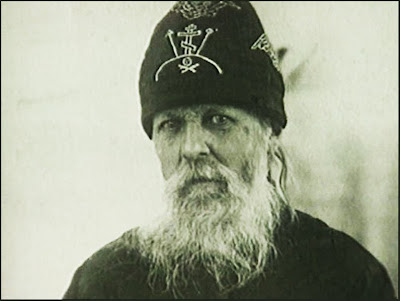
There was a mystical connection between Vasily Muravieov and two Holy Fathers - his Spiritual Father the Venerable Elder Barnabas and St. Seraphim of Sarov, who Vasily was named after during his monastic life. In the writings of Elder Barnabas you can find a place where he mentions one of his spiritual children V.N.M (Initials for Vasily Nikolaevich Muraviov) who saw a beautiful dream:
"I was walking to the services at St. Nicholas' Monastery through the forest trying to find the path. Suddenly I saw an Elder with a sack behind his shoulder and small axe. I asked him if he knew how to get to St. Nicholas' Monastery and the Elder answered: 'Let's go, I will show you. I am going there myself.' I looked at this Elder more closely and recognized St. Seraphim of Sarov in him and asked: 'Batyushka, are you Father Seraphim?' The Elder answered: 'Yes, I am Seraphim', and they continued to walk. Fr. Seraphim stopped near a small stump, sat on it, and put his sack and axe on the ground. I sat near him. Suddenly, from another side very unexpectedly appeared Father Barnabas and he sat near me so I was between both Elders, who were very joyful, and gave hugs and kisses to each other and started to talk, but I couldn't understand what they talked about and awoke...."
When Vasily told about his dream to his Elder Barnabas, the Elder laughed: "You were sitting between us, hearing everything and couldn't understand what we talked about?"
Already at the end of the 1920's Elder Seraphim was well known as a healer. One demon possessed woman was healed right after Elder Seraphim said a prayer above her head and annointed her with holy oil from his lamp.
Hieroschemamonk Seraphim was the spiritual Father of St. Alexander Nevsky Lavra for almost 3 years. He had so many people coming for confessions to him that sometimes he could spend two days hearing confessions while standing on a cold stone floor, without any break. But Fr. Seraphim didn't think about himself. Of course such physical and spiritual stresses (how much grief of so many people he would take on himself!) soon turned to serious health problems. Soon doctors diagnosed intercostal neuralgia, rheumatism and venous congestion of legs. For a long time Fr. Seraphim didn't tell anyone about it and continued to serve. And there was always such a bright and joyful smile on his face that no one from the brotherhood could think that their Elder was having such physical pain. Only his voice sometimes would get very quite. One day however Father Seraphim just couldn't get up from his bed.
Father Seraphim accepted his illness with humility as a new obedience. He was glorifying God's name: "I am a sinner and don't deserve even this illness. There are so many people who suffer from more terrible illnesses!" Doctors prescribed a change of climate, but Fr. Seraphim knew about the dark times coming for the brotherhood and wanted to share the sufferings with them. God had a different plan for him however.
Metropolitan Seraphim (Chichagov), a medical doctor by education, studied the illness history of Fr. Seraphim and immediately blessed him to move to Vyritsa. By the summer of the 1930's Elder Seraphim left the Blessed City of the Apostle Peter, as they call St. Petersburg. With the blessing of the Metropolitan, Schemanun Seraphima (in the world Olga Ivanovna Muraviova) and their twelve year old granddaughter Margarita, who was a young novice of Voskresensky Novodevichiy Monastery and would often visited Fr. Seraphim at Alexander Nevsky Lavra, went to him by obedience to help and take care of him.
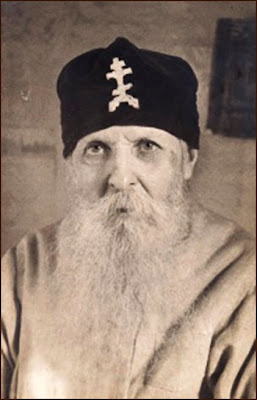
Soon a bloody wave of repressions drenched the entire Petersburg Diocese. During the night of 18 February 1932 the Bolsheviks arrested more than five hundred monks. Monasteries were completely devastated. It often has happened in Church history that during the most vicious times of persecution for the Orthodox Faith, God sends special men of God who are keepers of the purity of Orthodoxy. In the 30's-40's the Venerable Father Seraphim of Vyritsa became one of them. At that time he was writing poems as prophesies about the future of Russia. These poems were memorized by very many people, and reached prisons and camps. He was very ill at that time, but at Vyritsa he already didn't go to the doctors saying: "May God's will be for everything. Illness is a school of humility, where you really learn about your weakness." Soon streams of people embarked for Vyritsa. Many people gathered at the Elders's cell for days and nights. When his relatives worried about him and his health condition, Elder Seraphim answered them: "Now I always will be ill. While I can raise my hand to bless people, I will be meeting with them."
Father Seraphim always invited first those people who needed him the most. Every time a lay-sister would come out and call someone by their name and hometown, where this person was standing and where he/she came from. It was a mystery how the Elder could know all these things.
For very many people Fr. Seraphim was a benefactor who helped them not only spiritually, but with practical advice, helping them to find jobs and money through kind people. Very often he would thankfully accept money from his visitors, but Fr. Seraphim gave this money right away to those who had need of it. If some people gave him some clothes, Fr. Seraphim always found someone to give them to.
Elder Seraphim was always very strict with himself. He was always in fasting, all-night vigils, and prayer. On Mondays, Wednesdays and Fridays the Elder didn't eat any food at all. Sometimes he didn't eat any food for several days. People who were around him sometimes thought that he starved himself to the death. It is difficult to call food what he ate in those days: in some days he ate part of prosphora and drank some holy water. At other days he didn't eat even one potato, and would eat some grated carrot. Very seldom did he drink a cup of tea with a very little piece of bread. Priests from the church of the Kazan Icon of the Mother of God at Vyritsa gave him Holy Communion every day.
Imitating his heavenly teacher, Venerable Father Seraphim of Sarov, he undertook a new podvig on himself. He would pray in the garden on his knees on the rock before the icon of the Wonderworker of Sarov. This was happening in those days when his health was very bad. The first testimonies of St. Seraphim of Vyritsa praying on the rock are from 1935, when the persecutors descended upon the Church again. For ten years the Elder endured this podvig. In truth it was martyrdom in the name of love for his neighbors. With many hot tears the Holy Elder was praying to God asking revival for the Russian Orthodox Church and for the salvation of the whole world.
People really didn't know when he was sleeping. Every time when someone opened the door of his cell they found him on his knees crying and praying with his hands to the sky, not noting anything around him.
Fr. Seraphim had many visitors. Many times in the 30's Chekists [Bolshevik secret police] came to his cell searching his things. Once the Chekists came to arrest the Elder, but people who lived with Fr. Seraphim in the house asked to call for the doctor to confirm his heath condition. When the doctor came he confirmed that the health of Fr. Seraphim was in very serious condition and didn't allow them to move him to another place. Another time, when the Chekists came again, Fr. Seraphim's love won them over. Sudden spiritual change in the soul of the man in charge brought them to leave the house without touching the humble Elder.
Lions were obedient to the venerable fathers Anthony the Great and Zosima, bears to St. Sergius of Radonezh and Seraphim of Sarov. And the most cruel cruel animals in the form of humans were obedient to Fr. Seraphim of Vyritsa.
In 1941 Nikolai Muraviov, son of Fr. Seraphim, was arrested and executed. New grief came into the Elder's life.
Fr. Seraphim knew about the upcoming Second World War and the horrible years of it for Russia. When Nazis attacked Russia, Fr. Seraphim started to pray on the rock in his garden every day. In 1941 Fr. Seraphim was 72 years old and his health was bad, and his relatives would help him walk to that rock, and sometimes they just carried him there. Those close to him asked him to stop this praying on the rock, as they saw how hard it was for him physically. They put the icon on a young apple tree near that rock. He would pray on the rock as long as he could. Sometimes an hour, sometimes two, sometimes several hours. It was impossible to look at his sufferings without tears. They asked him to stop this podvig and pray at his cell, but he didn't have mercy on himself. God himself helped him to do this podvig! This continued during all four war years for Russia.
It is a known fact, according to the words of the Elder himself, that not one house at Vyritsa was destroyed during that war. And no one man from Vyritsa was killed. Another miracle was that when Nazis were ready to occupy Vyritsa, they sent there those soldiers who were Orthodox Romanians. And if the Church of Kazan Icon of the Mother of God was closed, but, Glory to God!, not devastated in 1938 by the Bolsheviks, it was opened again by the very many requests of the people. In the beginning people were feeling very uncomfortable at the church, having occupants in Nazis uniform standing next to them, but after seeing that they prayed and crossed themselves as it is required by the church, they stopped worrying.
When Nazis heard about the prophecies of the Elder they also went to visit him. And as before with the Chekist's, Fr. Seraphim could disarm uninvited visitors with the help from above. First of all they were amazed when he greeted them with his good German that he had learned from the years when he was a merchant and would often visit Berlin and Vienna, working with German and Austrian companies. One Nazi asked him when Germans will take Petersburg. The Elder answered that this will never happen and Germans will be leaving Russia soon, and the man who asked this question would not return home alive and be killed near Warsaw. One of those Romanian officer's visited Vyritsa in the 1980's to venerate the Elder's grave. He found people who lived in Vyritsa during the war and confirmed the destiny of the man who had asked that question.
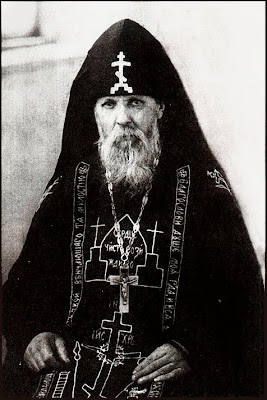
In 1945 Schemanun Seraphima (Olga Nikolaevna Muraviova, wife of Vasily Muraviov, the future St. Seraphim of Vyritsa) reposed. Fr. Seraphim knew and talked about how the separation is not for too long and soon they will meet in eternal life.
During the last years of his life Elder Seraphim was bedridden. The hour of his repose was revealed to him. Day's before this he blessed his home-folks with icons of the revered Seraphim of Sarov and told Mother Seraphima, his keleinica (lay-sister), to be mindful of her ribs during his funeral. (This warning was prophetic - during the funeral, since because of the very big crowd of people in attendance, Mother Seraphima had two of her ribs broken.)
Early in the morning the Most Holy Theotokos was revealed to him in splendor. With her right hand she pointed up to the sky. Elder Seraphim told about this to his home-folks and said: "Today I can't recieve visitors", and blessed to call Fr. Alexey Kibardin. The Akathists to the Most Holy Theotokos, St. Nicholas and St. Seraphim of Sarov were read. After taking Holy Communion Elder Seraphim blessed to have read the Psalter and the Holy Gospel. Closer to the evening Batyushka asked to put him on the chair and he started to pray. During prayer he sometimes asked what time it was. Around 2 o'clock after midnight he blessed to have read a prayer for the departure of the soul, then crossed himself with the words, "Lord, save and have mercy on the whole world!", he departed for the heavenly dwelling place.
For three days an unending stream of people visited the coffin of the Elder. Everybody noticed that the Elder's hands were very soft and warm, as if he was alive. Some people could smell a fragrance near his coffin.
On the first day after Elder Seraphim's repose a blind girl was healed. Her mother brought her to his coffin and said: "Kiss the hand of grandfather." Soon after that the girl started to see.
There were three big choirs during the honorable burial of St. Seraphim of Vyritsa: of Kazan, of Peter and Paul at Vyritsa, and of the Theological Academy and Seminary. On that day, with the blessing of Metropolitan Gregory of St. Petersburg, classes at the Academy and Seminary were cancelled. One of the students who was standing near the coffin of the Elder was the future Patriarch of Russia Alexey II.
The Holy and Venerable Father Seraphim of Vyritsa reposed on April 3rd, 1949.
Holy Father Seraphim, Pray to God for us!
V.P. Philimonov, Magazine "Tserkovny Vestnik"
Translated by Mira Parker
See also:
http://serafim.com.ru/site/nstr_3.html
http://serafim.com.ru/site/nstr_1_01.html
http://serafim.com.ru/site/nstr_1_02.html
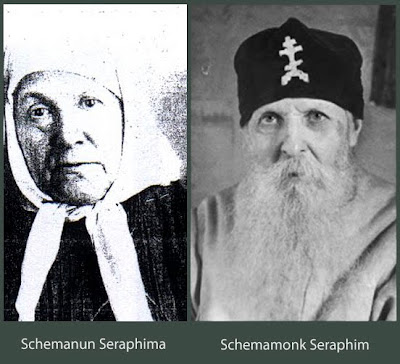
Translator's Note: A Miracle of St. Seraphim of Vyritsa
Here you go... I am here in America translating this very interesting article about St.Seraphim of Vyritsa during the last few weeks, going through very many photographs, details of his life, his icons, etc. Vyritsa is near St. Petersburg, and I was reading how St. Seraphim was praying during WW2 for all the soldiers, for Russia, for the whole world, and how he told Romanian Nazis who came to ask questions that Germans will never take Leningrad...
I am moved...
Doing all this work, I remember about my uncle, who I never met, who was killed during WW2 near Leningrad (St. Petersburg). My family didn't know where his grave is, and when it happened. Mom said that in 1943 they received a telegram about how he disappeared. This is my Mom's older brother. My mom told me this story many times. His wife was very beautiful and never got married again, because she was waiting for him to come back home. My grandmother was waiting for him throughout all her life. His daughter grew up not remembering him.
So... I am reading and at some moment I thought: "My uncle was there at war, when St. Seraphim of Vyritsa was praying on the rock during 1000 days. My uncle was so close to that place... It would be nice to find his grave one day..." I know that my relatives tried to do it before, but didn't have any success.
I sent my translation to John Sanidopoulos, who wants to publish it on his blog. And on the next day (yesterday) my Mom called me and said they found on the Internet where my uncle was buried in January 1943 near St. Petersburg. In a mass grave.
She told me about it and I remembered one of the photographs of St. Seraphim of Vyritsa, that I like so much. I knew that it was him who helped. You know, I was thinking about him during these few weeks a lot, about his life, his family, his wife, his podvig. And during several years I was praying for my uncle, who I never met. And now his daughter is going to visit his grave this month.
It didn't happen before. It didn't happen a month or a week after. It happened right at that time when I was reading, translating and thinking about him here, in America, and my relatives started again to look for information about my uncle at THIS time, being there, at Kazakhstan. Isn't this a MIRACLE? :-)
Glory to God for All Things!

Vasily Muraviov, his wife Olga and son Nikolai

Wife Olga and son Nikolai
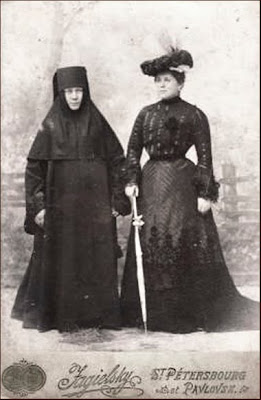
Mother Theophania and Olga Muraviova
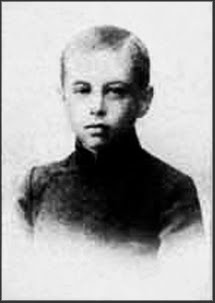
Son Nikolai
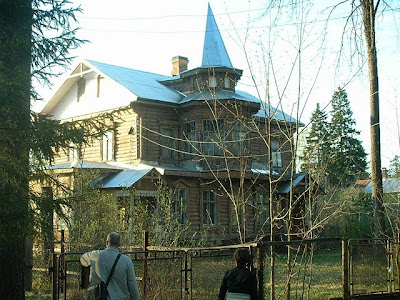
Photo of family home
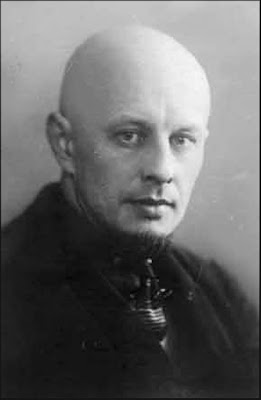
Son Nikolai, 1930's
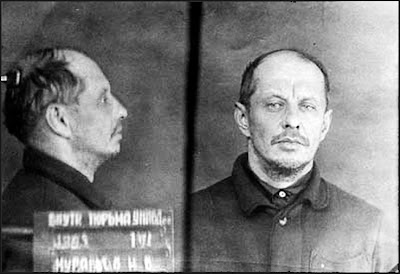
Nikolai prison photo
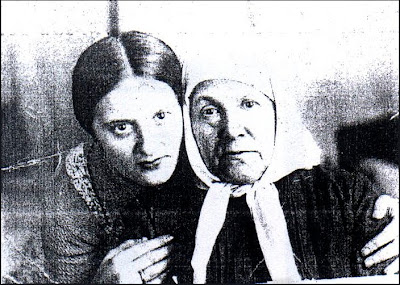
Schemanun Seraphima (Olga Muraviyov in the world) and granddaughter Margarita
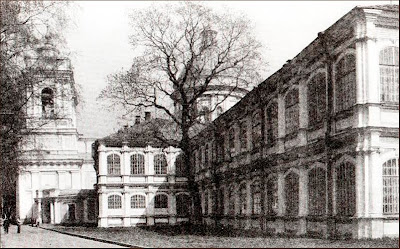
Nevsky Lavra, 2nd floor, 3rd window from the left is the cell of Elder Seraphim. There is a chapel now in his cell.

St. Alexander Nevsky Lavra

Last years

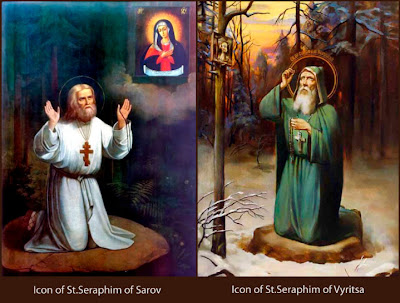
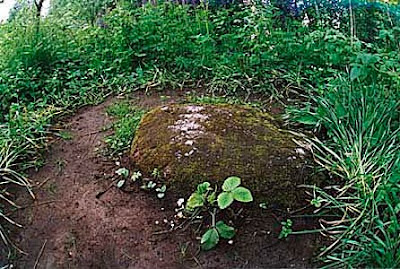
Rock he was praying on for 1000 days.
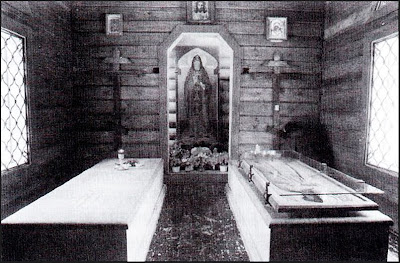
Schemanun Seraphima (left), St. Seraphim (right)



The wooden cross is said to be shedding myrrh.
See more here.